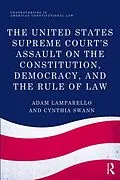This book argues that the judiciary, particularly the Supreme Court, should embrace an interpretive framework that promotes equal participation in the democratic process, fosters accountability, and facilitates robust public discourse among citizens of all backgrounds. The authors propose a solution that strives to restore integrity to the Court's decision-making process by eschewing ideology and a focus on the utility of outcomes in favor of an intellectually honest jurisprudence that gives all citizens a meaningful voice in governance.
The work is divided into seven parts. Parts I-V identify the worst decisions in the Court history and the common themes that helped produce them. The chapters within each part are dedicated to a single Supreme Court decision, in which the authors analyze the Court's reasoning and explain why it undermined federalism, separation of powers, and democratic governance. Additionally, the authors explain why these decisions compromised the relationship between the Court and coordinate branches, the federal government and the states, and citizens and their elected representatives. Part VI identifies several of the best Supreme Court decisions, and explains why they provide a principled framework that can be applied in other cases and result in a pro-democracy jurisprudence. Finally, in Part VII the authors propose a comprehensive solution that should inform the Justices' judicial philosophies, regardless of ideology, and strive to promote an equal and participatory democracy. The final chapter offers concluding thoughts and argues that a healthy democracy is the foundation upon which equality rests, and that a collective view of rights is the path by which to restore liberty for all citizens.
Autorentext
Adam Lamparello is a law professor and attorney who has taught at Loyola University College of Law in New Orleans, Louisiana and Mercer University School of Law in Macon, Georgia.
Cynthia Swann is a law professor and attorney who has over twenty years of practice experience in Washington, D.C., and who has taught at the Appalachian School of Law.
Inhalt
Introduction
Part 1: The Cases that Prohibited the Legislative and Executive Branches from Remedying Inequalities in the Political and Democratic Process
1. Citizens United v. FEC
2. McCutcheon v. FEC
3. Clinton v. New York
4. U.S. Term Limits v. Thornton
Part 2: The Cases in which the Court Inappropriately Deferred to the Legislative and Executive Branches
5. Chevron, Inc., v. Natural Resources Defense Council
6. Korematsu v. U.S
Part 3: The Cases that Expanded Judicial Review at the Expense of Democratic Governance
7. Griswold v. Connecticut
8. Roe v. Wade
9. Planned Parenthood of Southeastern Pennsylvania v. Casey
10. Lawrence v. Texas
11. Obergefell v. Hodges
Part 4: The Cases that Weakened Individual Rights and Promoted Inequality
12. The Slaughterhouse Cases
13. Milliken v. Bradley
14. San Antonio School District Rodriguez
15. McClesky v. Kemp
16. General Elec. Co. v. Gilbert
17. Kelo v. City of New London
Part 5: The Cases that Encroached on State Authority and Individual Autonomy
18. Lochner v. New York
19. Wickard v. Filburn
20. Important Cases that Did Not Make the List
Part 5: The Landmark cases that Strengthened Democracy, Promoted Federalism and the Rule of Law, and Preserved the Court's Institutional Legitimacy
21. Brown v. Board of Education
22. Washington v. Glucksberg
23. Austin v. Michigan Chamber of Commerce
24. United States v. Nixon
25. United States v. Lopez
26. Texas v. Johnson
27. Gideon v. Wainwright
Part 6: An Interpretive Theory that Promotes Federal, Separation of Powers, and Principled Judicial Review
28. Is Democracy a Good Thing? The Arguments - and the Practicalities
29. Foundational Principles for A Pro-Democracy and Process-Oriented Jurisprudence
30. Applying the Foundational Principles To the "Worst" Supreme Court Decisions and Arriving At Non-Ideological, Process-Oriented, and Pro-Democracy Outcomes
Concluding Thoughts
